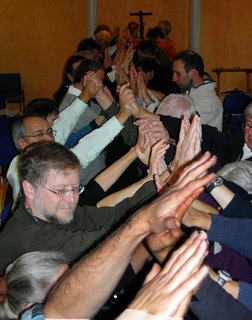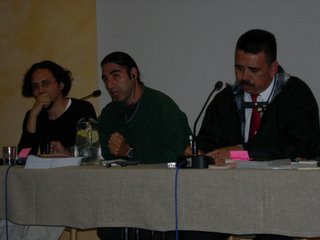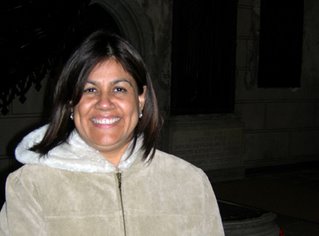Mexican perspectives on walls
 The third wall we focused on is the barrier being constructed along roughly one-third of the United States-Mexico border's 1,920-mile expanse. The Rev. Kim Erno, ELCA program director of the Lutheran Center in Mexico City, introduced a set of presentations that included photography, film, cultural and historical analysis, and personal testimony.
The third wall we focused on is the barrier being constructed along roughly one-third of the United States-Mexico border's 1,920-mile expanse. The Rev. Kim Erno, ELCA program director of the Lutheran Center in Mexico City, introduced a set of presentations that included photography, film, cultural and historical analysis, and personal testimony.On Friday evening we heard from Maria Teresa Fernandez, a San Diego-based photographer who presented an exhibit of images she took along the corrugated metal wall that separates San Diego and Tijuana. The arresting images from her collection provided a visual backdrop for the presentations on Saturday.
 Saturday started with a documentary, "Borders: Walls and Immigrants," by conference participants Pablo Gleason González and Armando Villegas Contreras and produced by Kim Erno. The film showed the dangers associated with crossing in the desert regions of the border, the economic pressures that drive Mexicans north, and examined the arguments surrounding the border.
Saturday started with a documentary, "Borders: Walls and Immigrants," by conference participants Pablo Gleason González and Armando Villegas Contreras and produced by Kim Erno. The film showed the dangers associated with crossing in the desert regions of the border, the economic pressures that drive Mexicans north, and examined the arguments surrounding the border.We then heard analysis from a faith perspective from Francisco Garcia Aten, director of an outreach center for immigrants who pass through his town (up to 3,000 per day in peak season) in the northern Mexican state of Sonora en route to the United States.
John Bertrand, a participant from the United States, expressed concern that in his home state of Arizona immigrants are placing a strain on the social systems, causing hospitals to close and taking tax dollars away from U.S. citizens. Pablo Gonzalez responded by saying the immigrants do pay taxes through social security, and they provide much more economic benefit for the U.S. than they use, in the form of cheaper food and cheap labor in many service sectors.
Palestinian filmmaker, Walid Atallah, commented that in an increasingly globalized economy, goods travel more freely across borders, but the workers are stuck in their countries. He pointed out that this problem is not just happening in Mexico, but around the world.
We also received historical and cultural perspectives from Dr. Olivia Ruiz about shifting border between the U.S. and Mexico and its effects on the culture surrounding the border region. Ruiz, a cultural anthropologist in Tijuana, Mexico, said that border policy has been influenced by the United States' "economic addiction" to cheap Mexican labor and that the increasingly militarized border zone serves as a "selective wall" that blocks migration by the poor.
 Following these presentations, there was a powerful personal testimony by the Rev. Maria Santa Cruz, a pastor of the Evangelical Lutheran Church in America who serves among immigrants in the San Diego, California area.
Following these presentations, there was a powerful personal testimony by the Rev. Maria Santa Cruz, a pastor of the Evangelical Lutheran Church in America who serves among immigrants in the San Diego, California area.The day finished with a theological reflection by Dr. Eliseo Perez-Alvarez on the links between Mexico's food insecurity and its increasing economic dependence on the United States as a result of the North American Free Trade Agreement.

0 Comments:
Post a Comment
<< Home